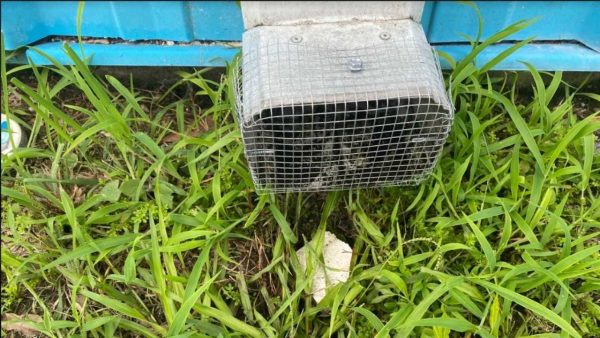Cost-effective and Trusted Exterminator in Port Charlotte for All Your Pest Control Issues
Uncover the Importance of Parasite Control in Keeping a Healthy Environment and Therapy Methods

The Duty of Bugs in Environments
Insects, commonly seen only as problems, play a complex role in environments that is essential for maintaining environmental equilibrium. They contribute substantially to numerous ecological procedures, including pollination, nutrition biking, and pest control. For example, numerous insect varieties, such as butterflies and , are vital pollinators for a vast array of plants, which subsequently sustains biodiversity and food production.
Additionally, bugs serve as victim for various killers, creating a vital web link in food internet. This connection ensures the survival of various types and assists control populaces within ecosystems (Termite treatment Port Charlotte). Decomposer bugs, such as specific beetles and fungis, are instrumental in damaging down natural issue, hence improving dirt and assisting in vitamins and mineral recycling.
Alternatively, while parasites can be advantageous, their overpopulation or invasion into non-native environments might interrupt these environmental features. This complexity emphasizes the value of comprehending parasite characteristics, as efficient parasite monitoring techniques have to take into consideration both their environmental roles and prospective influence on human activities. Stabilizing pest visibility while lessening harm is vital for preserving the honesty of ecological communities and making certain agricultural productivity.
Wellness Dangers Related To Bugs
The existence of insects in different environments expands past their eco-friendly functions, as they additionally posture considerable health threats to pets and human beings. Numerous pests, consisting of parasites, rodents, and bugs, are service providers of conditions that can have significant wellness ramifications. Rodents are known to transmit hantavirus and leptospirosis, both of which can lead to severe respiratory and kidney problems, respectively.
Pests such as ticks and mosquitoes are infamous for spreading out vector-borne illness like jungle fever, dengue fever, and Lyme condition. These health problems can result in high morbidity and death prices, specifically in susceptible populations. In addition, parasites like cockroaches and insects can exacerbate allergies and asthma, adding to respiratory system problems in individuals, specifically those with pre-existing conditions.
Furthermore, the presence of insects can bring about psychological tension and discomfort, affecting overall health. Contamination of food and surfaces by bug droppings and remains can result in foodborne ailments, highlighting the significance of preserving hygienic problems. Recognizing the health dangers connected with bugs is vital in acknowledging the requirement of efficient insect management approaches to secure human and animal health.

Advantages of Reliable Insect Control
Reliable pest control is vital for maintaining a safe anonymous and healthy setting, as it constantly minimizes the various threats connected with pest problems. One of the key benefits of efficient bug management is the reduction of wellness hazards. Insects such as rodents, insects, and cockroaches are vectors for conditions that can influence both people and family pets. By controlling these populations, the likelihood of condition transmission is significantly decreased.
Furthermore, effective insect control safeguards building and structures from damage. Several insects, like termites and woodworker ants, can trigger extensive architectural damage that might require costly repair services. By proactively managing these home owners, companies and invasions can safeguard their financial investments.
One more considerable benefit is the improvement of general top quality of life. A pest-free environment adds to psychological wellness and lowers tension connected with infestations. Furthermore, effective pest control promotes a much safer atmosphere for pets and youngsters, guaranteeing that homes stay refuges free from disease-causing microorganisms and unsafe chemicals.
Typical Parasite Control Techniques

In the world of parasite management, various strategies are utilized to fight infestations properly. These methods can be broadly classified into termite pest 3 primary methods: social, mechanical, and chemical controls.
Cultural control involves changing practices to lower bug survival, establishment, and reproduction. This may include plant turning, correct hygiene, and environment manipulation, which jointly produce an environment less favorable to pest expansion.
Mechanical control employs physical approaches to eliminate bugs (Termite treatment Port Charlotte). Strategies such as obstacles, catches, and vacuum cleaners are frequently used to directly get rid of bugs from an area. This strategy is especially reliable for handling rodents and bugs without making use of dangerous chemicals
Chemical control includes the application of pesticides to handle parasites. These materials can be classified right into fungicides, herbicides, and insecticides, each targeting specific sorts of parasites. It is crucial to use these chemicals deliberately, sticking to safety and security standards and guidelines to lessen possible injury to non-target types and the atmosphere.
Each parasite control technique has its advantages and restrictions, and typically, an incorporated strategy incorporating numerous techniques yields the very best cause preserving a pest-free atmosphere.
Sustainable Parasite Management Practices
Sustainable insect management techniques include a variety of methods made to decrease ecological impact while effectively regulating parasite populaces. These methods prioritize using eco-friendly methods over chemical pesticides, consequently reducing the threat of damage to non-target varieties, including valuable pests, wild animals, and human beings.
Integrated Insect Administration (IPM) is a cornerstone of lasting methods, incorporating biological, social, mechanical, and chemical methods to handle parasites. As an example, organic control involves presenting natural killers or parasites to subdue bug populations. Social practices, such as plant rotation and polyculture, disrupt pest life cycles and boost ecosystem strength.
Mechanical methods, such as catches or obstacles, can properly protect against insect access without chemical intervention. In addition, preserving healthy environments through appropriate dirt management, plant wellness, and biodiversity can naturally minimize insect concerns.
Education and awareness are important components, encouraging individuals and areas to identify insect hazards early and carry out safety nets. Termite treatment Port Charlotte. By fostering an all natural method that stabilizes bug control with eco-friendly honesty, sustainable insect administration techniques not just secure frameworks and plants but likewise add to a healthier environment for future generations
Verdict

Understanding the health threats associated with parasites is critical in identifying the requirement of effective insect monitoring his explanation approaches to secure human and animal wellness.
Efficient insect control is vital for preserving a safe and healthy atmosphere, as it consistently minimizes the countless dangers connected with parasite problems.Integrated Parasite Monitoring (IPM) is a cornerstone of lasting practices, integrating organic, social, mechanical, and chemical strategies to take care of pests. By comprehending the duty of pests, acknowledging associated health and wellness threats, and employing varied therapy techniques, a lasting approach to pest management can be achieved. Integrated Insect Monitoring (IPM) stresses an alternative method that minimizes harm to helpful microorganisms while efficiently managing bug populaces.